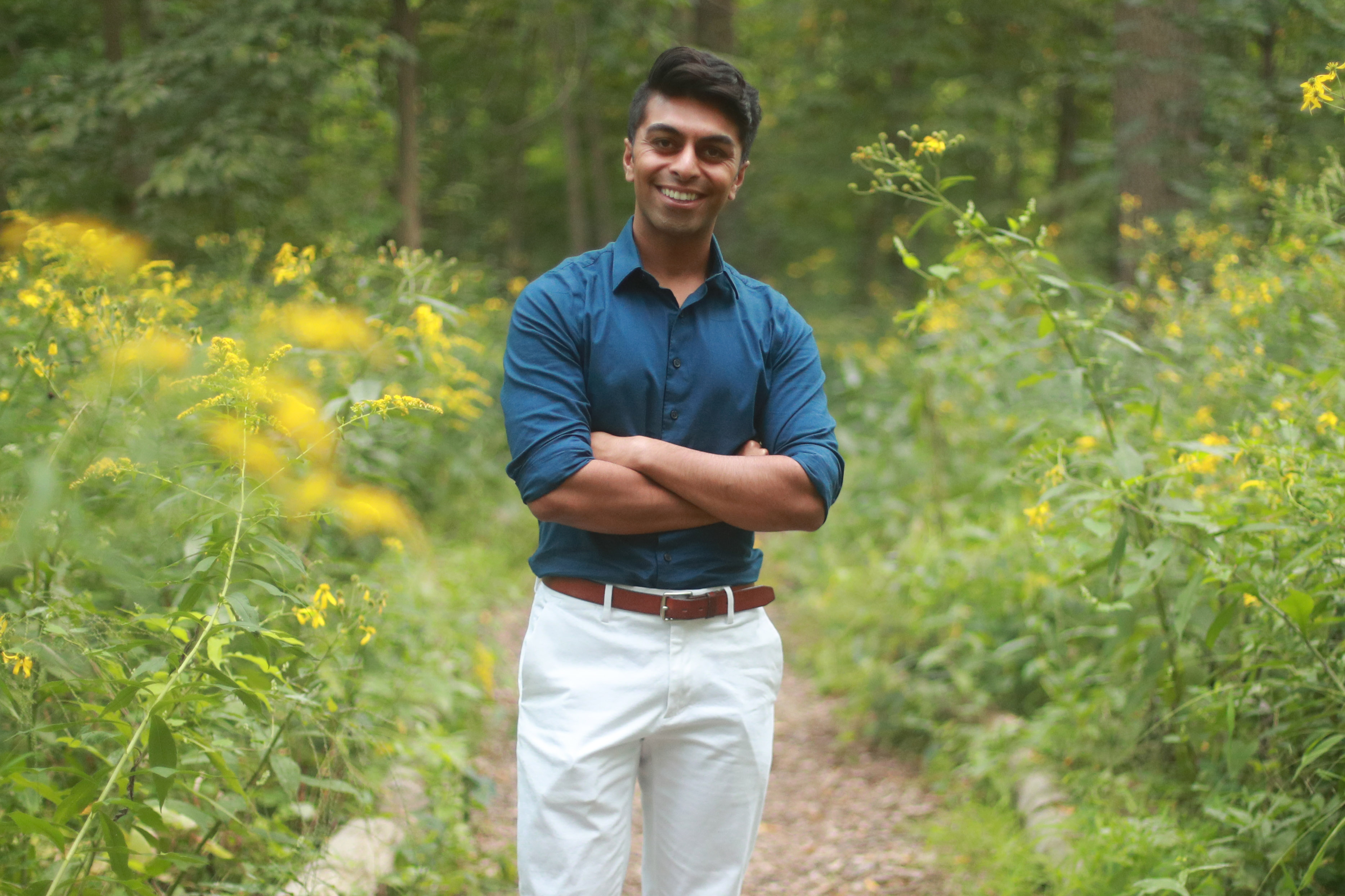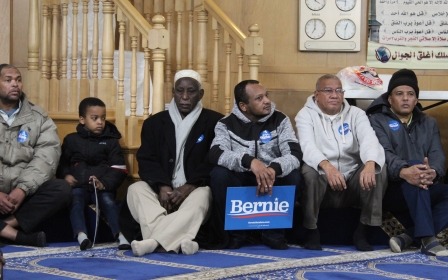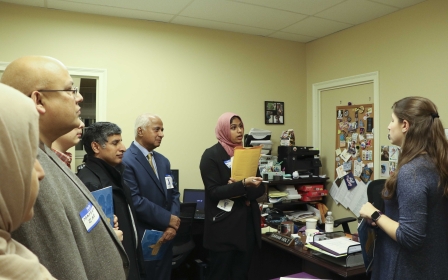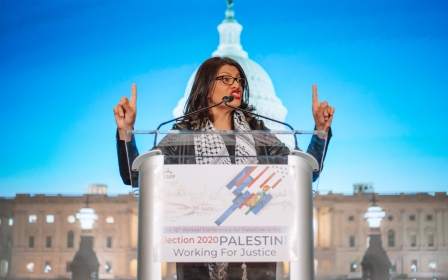Meet the progressive Democrat running for Congress in the heart of Arab-America

Congressional hopeful Solomon Rajput says his early morning commute to school, more than 20 years ago, left an indelible mark on his political outlook.
Growing up in Ann Arbor, Michigan, a school bus would pick him up from his family home and take him on a journey through some of the city's less-developed neighbourhoods and pothole infested roads.
Looking out from the windows, shops would be closed and their windows boarded up.
But within a matter of minutes, the journey would begin to get smoother and far less daunting.
'We're the richest country in the world, we have so much money and we are acting like we're a developing country'
- Solomon Rajput, congressional candidate for Michigan's 12th district
The smell of freshly cut grass would fill the air as the bus, now on freshly tarmacked roads, drove past split-level houses adorned with perfect patches of green lawns - an idyllic vision of the American dream.
New MEE newsletter: Jerusalem Dispatch
Sign up to get the latest insights and analysis on Israel-Palestine, alongside Turkey Unpacked and other MEE newsletters
"Our bus route went through trailer parks and then through neighbourhoods that had like hundreds of thousands or millions of dollars," Rajput told Middle East Eye.
In a city where more than 20 percent of its residents live below the poverty line, Rajput, a 27-year-old medical student at the University of Michigan, says it's because of these early morning commutes that he's standing for Michigan's 12th District in the US Congress later this year.
The son of Pakistani immigrants, Rajput has spent the past few months campaigning on a platform that includes cancelling student debt, Medicare for all, affordable housing and a progressive approach to climate change.
"We're the richest country in the world. We have so much money and we are acting like we're a developing country," Rajput said, referring to US healthcare and the higher education system.
Michigan Resistance
Rajput began his journey into US politics when he campaigned for Vermont Senator Bernie Sanders in the 2016 primary elections.
After Hillary Clinton won the ticket, he says he was forced to make a choice: either not support Clinton and enable her Republican rival Donald Trump to win the race for the White House, or throw his energy behind Clinton's campaign.
Ultimately he chose the latter.
"As a Muslim, it was of the utmost importance for me to figure out how we could try to defeat Donald Trump even if Hillary Clinton didn't necessarily align with my progressive stance," he said.
After Trump won the election, Rajput says his frustration gave birth to a new grassroots, progressive campaign: the Michigan Resistance.
Rajput, who had become one of Michigan's top three campaign organisers at the time, led confused Clinton campaign volunteers into action, mobilising them to stop certain bills from passing. He says they were bills that would have made it easier for dark money to be in US politics, would have cut healthcare from firefighters, and rolled back environmental regulations.
More than 1,000 phone calls later, Rajput says Michigan Resistance has helped stop a dozen bills from being passed.
The Muslim vote
Growing up in a Muslim household to Pakistani immigrants, Rajput says some of the standout moments from his childhood were from communal celebrations when children in the community finished reciting the entirety of the Quran - something which is usually done over a prolonged period of time and not in one sitting.
As he grew older, he realised this was not necessarily a tradition practised in all Muslim cultures, and this helped him developed a better understanding of how diverse the Muslim community is.
"It was a really great experience growing up there because you had the Muslim community, the Pakistani community and you were exposed to all different kinds of walks of life."
Rajput believes that his engagement with the Muslim community will help him capture the district, which also contains Dearborn, a city that boasts one of the largest populations of Muslims and Arabs in the United States.
Out of Dearborn's population of nearly 100,000 people, more than 41,000 are of Arab origin, according to the 2010 US Census.
But Arab-American advocates say the number is even higher because the census, which considers people of Middle Eastern origins to be white, undercounts the Arab population.
Several Muslim candidates have faced problems in the past when trying to activate the Muslim vote. When campaigning, they often encountered trouble in their traditional Muslim communities, where they had thought they would have strong support for sure.
A report co-published by the Council on American-Islamic Relations (CAIR), Emgage, and Jetpac said that a majority of Muslim candidates had faced these issues.
Rajput, however, said he's an anomaly. He told MEE that the Muslim community had been very receptive to his campaign.
"When we go and knock on doors there (Dearborn), the response has been tremendous. It's been very exciting."
While Islam is an important part of his identity, Rajput said his campaign was more about him being a progressive candidate, who happens to be Muslim.
"My community, my district is more than just Muslim people," Rajput said. "The thing is, the issues that I'm fighting for are issues that affect everyone."
The Dingell dynasty
In order to win the district, Rajput is going to have to take down one of the longest-standing political dynasties in modern America: the Dingell family.
For the past 87 years, a part of Michigan has always been run by a Dingell. John Dingell Sr was first elected to the state's 15th district in 1933, where he served until his death in 1955.
His son, John Dingell Jr, won a special election that year for his father's seat and after that went on to become the longest-serving congressman in United States history. He had served continuously as a congressman in Michigan, representing the 15th, 16th, and most recently, the 12th district.
'The beautiful thing is that the grassroots way is the most effective way. When it comes to big organising versus big money, big organising wins'
- Solomon Rajput
He passed away in 2015, and his wife, Debbie Dingell, has since replaced him as Dearborn's newest Dingell representative.
Still, Rajput believes he can take down the incumbent at the congressional primary election on 4 August through a grassroots campaign.
"Congresswoman Dingell is a perfectly nice person, but she's not out there representing the values of our progressive district," he said.
He emphasised that the 12th district has been a "bastion of progressive values" that was shown, partly, in the 2016 Democratic presidential primary election.
In 2016, Washtenaw County, which contains Ann Arbor, voted heavily in favour of Bernie Sanders in the primary election.
Still, Wayne County, which holds Dearborn, voted in favour of Hillary Clinton.
Grassroots over cash
Rajput believes with a progressive wave brought on by two Muslim congresswomen, Ilhan Omar and Rashida Tlaib, both of whom support Sanders in the 2020 Democratic primaries, he will be able to swing the 12th district in his favour.
"[Rashida] won through intense organising. And that's how we're going to win too," he said.
While this may be the case, Dingell's incumbency is not the only hurdle for him, she also has far more financial capital behind her.
Dingell has had nearly $2m banked for her campaign, and currently has over $500,000 left on hand to spend. Rajput has less than $20,000.
When discussing the issue of finances, Rajput pointed to personal conversations with the community, whether in person or over a phone call, saying they were worth more than a paid advertisement.
"The beautiful thing is that the grassroots way is the most effective way. When it comes to big organising versus big money, big organising wins," Rajput said.
Even with the odds stacked firmly against him, Rajput, with beaming smile, maintains that he's more than able to gain the Muslim vote and come out on top.
Middle East Eye delivers independent and unrivalled coverage and analysis of the Middle East, North Africa and beyond. To learn more about republishing this content and the associated fees, please fill out this form. More about MEE can be found here.






